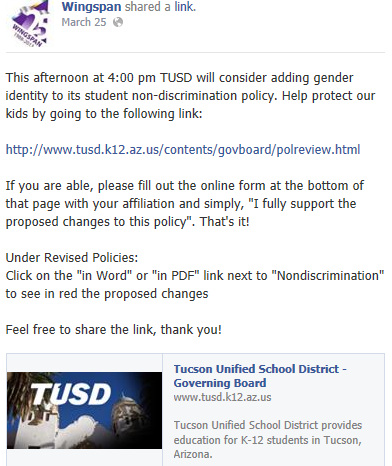 There are almost as many different accounts as to what led the Tucson Unified School District Governing Board this week to pass a vague policy which provides that students can use whichever bathroom they feel they identified with, in terms of a gender as there are administrators in TUSD. One point upon which almost everyone agrees is that the Board’s move was solely political, with little thought as to the welfare of all children.
There are almost as many different accounts as to what led the Tucson Unified School District Governing Board this week to pass a vague policy which provides that students can use whichever bathroom they feel they identified with, in terms of a gender as there are administrators in TUSD. One point upon which almost everyone agrees is that the Board’s move was solely political, with little thought as to the welfare of all children.
Depending on who you talk to, the recent use of the boys bathroom by a transgendered student was the cause of the rift in the Anna Henry School community, or the rift was the source of some of the complaints about the use of the bathroom.
What is undeniable is that parents contacted the district’s administration with their concerns about the use of the bathroom and an incident in which they felt a male student was the victim of indecent exposure. The administration ignored those parents until Board member Michael Hicks expressed his concern for the victimized student and questioned if the District had a bathroom policy in place.
The school’s principal John Bellasario told parents early on that the District “had tied his hands,” so he could do nothing about the situation. However, according to KVOA, Bellasario said later, “we have multiple restrooms, we have boys restrooms we have girls restrooms, we have unisex restrooms, and the children can use the restroom they identify with. That’s based on case law all over the country.”
But Kim Pearson, a national expert on transgender youth who was invited by the Administration to lead the workshop on gender identity at Anna Henry Elementary the day after the Governing Board’s vote, acknowledged that there are no laws on the books regarding restroom use. The issue is simply a matter of social convention.
According to sources, not until parents at Henry notified them that were no longer going to wait for the District to protect their kids from inappropriate exposure and had contacted the police, did Sanchez and crew finally take action. Superintendent Sanchez and Board president Adelita Grijalva, who never let a crisis go to waste, rallied the forces necessary to turn the sad situation into a political opportunity and replace social convention with a vague policy.
 Few knew of the administration’s plan, and even fewer were aware that the Board was being asked to vote on it at this week’s meeting. As a result, only a handful of people weighed in on the matter before the meeting, and almost all who weighed in supported the measure.
Few knew of the administration’s plan, and even fewer were aware that the Board was being asked to vote on it at this week’s meeting. As a result, only a handful of people weighed in on the matter before the meeting, and almost all who weighed in supported the measure.
With an election is looming rather than handle the complicated and delicate situation at Henry as an isolated case, the administration attempted to stage a melodrama. So Grijalva moved the bathroom item up on the Board’s agenda, and moved the Call to the Audience to after what was sure to be a controversial and emotional vote. The scripts were ready, but not all of the actors were on script.
The Board voted to revise its non discrimination policy. The old policy had prohibited discrimination based on disability, race, color, religious beliefs, sex, sexual orientation, age or national origin. The revision added “gender identity or expression.” It really didn’t change the nondiscrimination policy at all. It only added to new layer of meaning to using the restroom.
The ideologues had counted on Board member Michael Hicks to vote “no.” Instead Hicks, who Grijalva and friends have worked hard to villianize, voted “yes.” Much to their chagrin, Hicks didn’t play along and give them their made for television drama they wanted. He voted “yes,” which preserves his ability to bring the matter up later for reconsideration.
The revision was approved with a 4-1 vote, with Mark Stegeman, casting the dissenting vote.
Grimsby said during the Call to the Audience that she never thought Hicks would vote for the policy, or that she would have to thank him.
As disappointed as she seemed, Grimsby did say later that the TUSD Board’s policy decision was “cutting edge,” and she hoped it would become a national trend. And TUSD is frequently the incubator for national trends. Under the governance of Grijalva, the District is blazing new trails in the areas of school desegregation, curriculum, and pedagogy almost every day.
While few educators and District stakeholders believe that transgendered students should be denied equal access, they question the District’s refusal to acknowledge that some children have been harmed by the school’s failure to protect them. However, they applaud the fact that because of the efforts of Hicks, who had urged the administration weeks ago to protect students, the District has finally taken some steps to prevent future victimization by blocking off all the male urinals in the boys bathrooms.
The students have been instructed to use the stalls.
The policy is strictly political according to almost everyone involved. Little thought was given to students on either side of the debate. Carol Grimsby, Executive Director of Wingspan dismissed the distress of the children, including the boy who had felt that he had been a victim of indecent exposure. Grimsby told KOLD, “I would like to make a statement about the children saying they were uncomfortable. The reality is the parents were uncomfortable. The child saying that they were uncomfortable is taught that by their parents or the adult who is mentoring them.”
Later Grimsby said, “With appropriate education any uncomfortability (sic) would be alleviated. What I am advocating for is that all children should be treated the same, all children should be treated equally and having a separate bathroom is discriminatory.”
Grimsby did not elaborate on what that education might be, and has refused to say what steps should be taken on behalf of the child who was a victim of indecent exposure when a student he knew as a girl removed her underpants in front of him.
